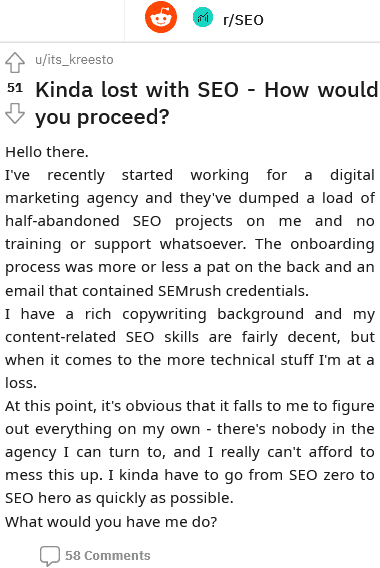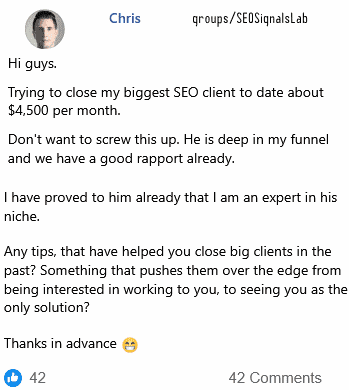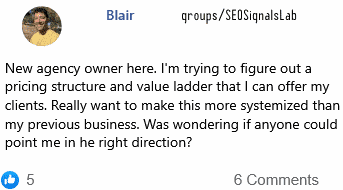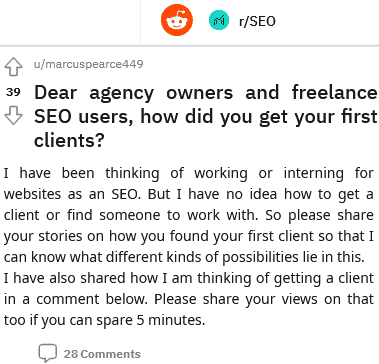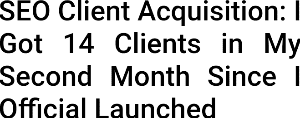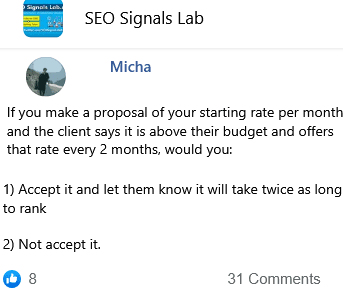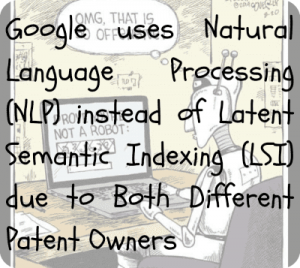Discussion 2: Being SEO-er with Average Skills
u/brokeoneyolk
Can SEO be a lucrative job for those with average skill?
I'm sorry I'm sorry if this is a bit if annoying post. I've been searching and reading but hoping for some realistic discussion.
My background: My strength is in research and writing (history degree + bachelor of education in Canada). It's what I love to do and I'm very good at taking essentially any topic and being able to synthesize information and write about it. When I was in uni I occasionally wrote for others in fields I knew nothing about and would get A.
I've been an entrepreneur for 10 years and I'm coming into a situation where I'm losing my primary business (due to external circumstances).
I'm looking for my next thing, I have the next 7 months or so to spend gearing up towards a new business.
I know almost nothing about Search Engine Optimization (SEO). I've done it successfully for my own business but was haphazard and unskilled. I do enjoy it though. I enjoy the puzzle and the challenge and feel I would enjoy the journey.
I'm not looking for a get rich quick/easily scheme, but I don't want to sink my time and energy into the wrong field/direction. I'm not a half asser and if I get dedicated to it I'm gonna be going hard.
In the end, I need to be able to earn a legitimate income. I don't need a tonne, I can live off less than $50k usd with my lifestyle. That said my previous business was six figures comfortably.
My primary interest right now would be doing local SEO for local businesses. I have no idea if that's the best angle. I do see myself as working self employed only, I haven't had a job in a long time and I don't intend to ever have one.
Hoping some people can give me some real honest feedback on whether they feel SEO is a legitimate option for someone like me? I know there's money in it, but is that really just for the Uber talented, top tier (which while I work hard and am a strong learner there's no reason to think I'll be amazing at it)?
I've analyzed it as a career some but real world opinions from people in various stages of development in it would be amazing.
Tia
29 💬🗨
📰👈
I've been on/off with SEO for about 4 years now as a side gig. I've been fairly successful by the metric of money earned. I am not particularly skilled and I've honestly spent maybe a few hundred hours working on Search Engine Optimization (SEO) in total. My Return of Investment (RoI) is pretty damn high.
I would never get a regular salary job doing SEO for a firm. The truth of it is, if you're actually good at SEO you should make exponentially more doing your own thing than working on salary for a company. The only positives of working for a company is potential healthcare.
Local business is not my specialty but I've heard getting paid can be tough and most local business don't have thousands to shell out every month for SEO. I would suggest ranking for local keywords. Think "best car detailing in xxx". Then you can sell the website to a car detailing or sell the #1 spot to a car wash or even sell them leads.
I think SEO should be about trying to make money fast. The internet is changing every day. Google changes the algorithms, the way people search changes, ads change, laws change, more competition. There are people who go from making 5-6 figures a month to nothing overnight. This industry is not that predictable long term or short term.
Local SEO is a bit softer but you still got to pay to play. Unless you find a holy grail niche, which is basically impossible these days, you are going to have to invest money to see a return. Investing in content and investing in backlinks.
To answer your question, you don't have to be uber talented. You just need to do a ton of research before hand and be willing to sink some time and money in. However, I don't think I would recommend it for most people.
Great info thank you. Good point about the changing nature of the industry while I'm aware of that I'm not sure I was really thinking about it. I suppose I like to think if I developed the skills I can pivot as the industry does but maybe that's not true. Oh well I guess I've gotten good at such risks over the years.
Good point about local. While I like the idea of working with local business perhaps it's unlikely to be a primary gig.
MossParkGuy
SEO is not as big a deal as people make it out to be – especially if you can figure out ways to create value over a small geography. And local SEO for local businesses is perfect
Check out local lead generation for small businesses. This takes things a step beyond SEO. Tons of businesses get cold calls by the 100s each month from people trying to sell them SEO. You should consider selling them actual referrals/leads. I live in Canada myself and recently stopped working a job and have started doing this full time. There are literally millions of small businesses to help, who don't know the first thing about digital marketing so they're happy to partner up with you if you can show them value up front and make them believe you know what you're talking about.
I'd stay away from affiliate marketing and amazon fba and those gigs that are over-saturated and hyper competitive, for what my 2 cents are worth
High ticket or recurring affiliate marketing is still worth it. Rank the blog content and grow your email list.
Money can surely be made, it's not impossible of course. The question is what are your chances. The answer in <year> is "pretty low". the competition for high ticket niches is pretty fierce and the number of hours you'd need to put in is in the 100s, if not 1000s, including a decent amount of money to actually rank that blog. Then, there's a small chance of you making some money
It can be done, but there are better ways of spending your time, sweat and money than trying to scale the Mt. Everest that is affiliate marketing. Most data out there supports this line of thought. But again, for every 1000 new affiliate marketers that start out today, 10-20 may make some money but nearly all those 10-20 would be making in cents/hour
MedalofHonour
Yes depends on your niche. Competition or saturation to me just means there is money to be made. I mix SEO with paid ads along with my own digital products.
Affiliate marketing brings in good extra revenue every month whether promoted to clients or in a ranking blog post.
It's better to charge clients more and deal with less people in my opinion. It's easier with a growing email list too. But I get what you are saying.
MossParkGuy
For sure. paid ads and email lists are sort of affiliate marketing 3.0, at least in my mind. And latching on to a high quality high ticket digital product can make all the difference too for sure. And if you have one of them, it can be well worth your time
BapaLynde
That's a good way of looking at it. A lot of SEO users tend to think about SEO for SEO users sake, rather than it being a function of marketing and ultimately selling a product/service.
Exactly. The point of SEO is growth in business, and that is what I try to sell/offer. SEO in and of itself is worthless
brokeoneyolk ✍️
Ty for this information. I never liked the idea of affiliate marketing much tbh, so glad to hear it doesn't look like I'm missing out much.
Providing value is something I can sell, and feel good about. My mindset in business has always been to do a good job and be as good as I can be and let the money follow that. Affiliate marketing doesn't really match that all that well imo
WoodRescueTeam
This is the truth
📰👈
felishathesnek
There are a lot of really talented SEO users that don't make much because they're bad at selling. There are also a lot of mediocre SEO users making buckets because they're good at selling.
People buy what they like. Not what's best for them. Learn to sell + learn SEO.
Exactly I am not the best at SEO but I am good at marketing and selling.
I'm mediocre at selling I think, at least, I don't have that special knack some people do.
I'm fairly experienced with client communication and whatnot though, and I can sell… hopefully good enough I guess.
rpmeg
I say if you like it, go for it. There's definitely money it it, and you can learn everything yourself.
For local SEO, i say start learning Google My Business optimization (not technically "SEO" but it falls under the umbrella and is very important/easy). That is the lowest hanging fruit. Its not like website SEO where you have a bunch of control, but there are some basic things you need to do. Basically just fill out ALL of the info and get as many real reviews as possible. To encourage reviews I always order a print signage QR code that leads them to a review.
For local SEO of your website, research these things in this order "keyword research" "on-page SEO" and "citations / local link building". Blogging is still important, but not as important for local SEO.
there's all kinds of research out there, and with no formal training myself, it is now a lucrative career for me because I genuinely love doing it. I love the puzzle too, and the dopamine rush every time I see my stats go up.
The biggest challenge for me is the sales/communicating with clients/business side. As someone else on this thread mentioned, being good at sales is not equal to being a good SEO. So that side is definitely important too, and if you are a people-person you will definitely have a leg up
Ty. I intend to rank up my own site and a few others of friends as practice. In my experience Google My Biz (GMB) can be fairly easy, or a nightmare. My current business is in the nightmare stage so fixing that will be some lessons learned I think.
📰👈
How can you get the First SEO Marketing Client?
SEO Client Acquisition: I Got 14 Clients in My Second Month Since I Official Launched
40 KPIs Mixed Questions to Ask Someone Interviewing for an SEO Job?
Discussion 1: Rich Copywriting Skill, Descent SEO Content Writing Skill, Less Technical SEO Skill, You May Need Tools
u/itskreesto
Kinda lost with SEO – How would you proceed?
Hello there.
I've recently started working for a digital marketing agency and they've dumped a load of half-abandoned SEO projects on me and no training or support whatsoever. The onboarding process was more or less a pat on the back and an email that contained SEMrush credentials.
I have a rich copywriting background and my content-related SEO skills are fairly decent, but when it comes to the more technical stuff I'm at a loss.
At this point, it's obvious that it falls to me to figure out everything on my own – there's nobody in the agency I can turn to, and I really can't afford to mess this up. I kinda have to go from SEO zero to SEO hero as quickly as possible.
What would you have me do?
58 💬🗨
📰👈
"A journey of a thousand miles begins with a single step" – I'd pick one site and work on it. Since they probably want to see results, try to pick a site that has the most potential.
Scaling from there to doing something for all sites is totally different, but you can't really do that without first understanding what works for one site.
Start small, tiny steps. You won't pick the best steps in the beginning but trying to figure out what the best step is before doing anything is often not as educational.
jhollabbk
Have a look the the SEO periodic table. I always try to refer to that.
Add some SEO people on LinkedIn – they often drop some cool tips. Here are a few people you can start with:
• Mark Williams-Cook (he also has a udemy course that I would recommend. It is amazing for technical SEO)
• Jeffery Kranz (his company overthink group also have some amazing blogs. I would check out his stuff on link lattices and pillar pages/content clusters)
• Daniel Foley Carter
SEO periodic table
I didn't even know this was a thing, thanks, I'll make sure to check it out!
IANALbutIAMAcat
I wish I had advice for you but I just want to say that as bullshit as your situation is re:poor onboarding, what a fun opportunity you have to flourish in your own skill set. I hope you figure it out.
If I were you, I'd document every bit of what I'm doing during this process because it would make for a rad portfolio. Even just using it as a demo portfolio to show a bigger company your ability to learn and thrive when put in a new situation with few tools.
marcdantes
I do not know how you got the job in the first place but I will advise you to be careful not to mess up someone else's means of livelihood. Back to your question, you are in already and you cannot run away. It is a challenge for you and you have to learn as much as you can within a short while. While learning, you should only implement what you understand. I will advise you to start with Ahrefs SEO course after that you can take Kyle Roof On-Page SEO course. Check YouTube on how to conduct a website audits using screaming frog. Since you already have access to SEMrush…you need to run a site audit with it and try to fix some of the identified issues. You really cannot do more than that based on your skill level. Finally, you need to start your own project to really learn. Build websites and rank them…that way your confidence and skills will improve. You also need an experienced mentor.
arembi
I have been doing SEO for 8 years now, started out without any help, same as you. There's only one thing that is still the same as it was back then when I started: I have to improve my skills every day, learn, adapt.
More websites, more competition, better spamming mechanisms, and more useless SEO reports (I mean the correlation between some SEO metrics and actual rankings is rare).
You have to monitor your SEO methods, strategies and reduce the time/resources spent on every project (with the same or better results) in order to improve. You won't be able to tell when you will reach top10, but you will be able to predict a range of expected ranking (3 months, 6 months, 2 years etc.). Keep the projects organized and never stop learning.
Imo technical knowledge is the cornerstone of Search Engine Optimization (SEO). Without it you don't really know what you are doing and the best you can do is to be lucky. Start with acquiring a basic knowledge of DNS, routing, web servers like Apache, nginx, HTML, JavaScript (async). Just what they are and what they do. And then you will be able to deal with content and search engine visibility.
Did you learn coding?
I was in the same boat as well, started from SEO content to technical.
I did pick up things in the past few months but don't have hardcore technical skillset yet
I have obtained web developer knowledge and skills, yes. I mean working with websites without knowing how they work doesn't make sense to me at all.
Mank
Why asynchronous specifically?
Asynchronous calls were not so common a couple of years ago in content management systems and Google had its problems running Javascript. Modern JS frameworks, templating systems are full of async calls. So in order to manage content properly you have to make sure Google will run your frontend magic and "render" your sites fully. I think constantly changing sites are really (maybe the most) interesting from a search engine evaluation perspective.
📰👈
diddyxking
My answer is mostly related to SEO tooling.
Short answer:
Keyword research: SEMrush
Common backlink analysis: Ahrefs (most complete backlink data), Majestic (best off-page metric)
Hidden backlink analysis (PBN backlinks): Linxact
Long answer:
SEMrush is a good tool for keyword research. So stick to that.
I assume that you need to analyze the SEO strength of competitors first. I would analyze competitor domains with Ahrefs for common backlinks and Linxact for hidden backlinks, which often originate from Private Blog Networks (PBNs). You could also use Majestic if you prefer a good off-page metric over more complete backlink data. Also analyze their on-page and content strategy and try to copy what already works for your competitors.
If you provide more information, I could give you some more guidance.
simitoko
Hey OP! Asking for clarification. I'm a 4 years SEO Strategist.
I'm a bit confused by your post: You mentioned you know SEO in the form of copywriting really well; Based on that information, I assume if you have done copywriting in SEO, then you have knowledge of SEMrush and keyword analysis already.
When you mentioned "technical"\- Are you having a bit of trouble with the coding, the data reporting and analysis or is it SEO in general?
Hello.
Yes, I've 7+ years of experience producing SEO content and can do a passable job with keyword research.
The problem is that a large chunk of my work experience had to do mainly with the Amazon marketplace, and SEO there is quite different (or so I gather).
Coding is more or less terra incognita.
And when it comes to data analysis and reporting, I don't really understand half of what I'm doing. I'm just going through the motions, trying to follow checklists and workflows I find online. Monkey see, monkey do. I don't really know what's important and what's not, so I can't prioritize.
The people here have already been very helpful, though, so at least I'm confident that I'm on the right track.
lgg
Here is what I would do early on to get some "quick wins":
• Read the On-Page SEO guides from Backlinko, Ahrefs , and moz.
• Familiarize yourself with Google Search Console (GSC) and Google Analytics (GA).
• Look at your website traffic in GSC to determine what keywords people are typing to find your site and how those keywords are ranking.
• Identify pages/keyword that are ranking 4-10, 10-20, etc.
• Make minor edits/adjustments to improve those pages. Prioritize 4-10. 10-20 will be next up. 20+ can't even worry about those for now.
• Come up with a content strategy to target new keywords.
• Ask for help with technical SEO.
I hope this helps!
📰👈
Do Your Case Studies Blend With Advertisement Purposes?
The Financial Level of SEO Experts
Someone Helping Friends For 9 Years For SEO Never Got Paid
19 Ultra Beginner Tips to Grow Website Traffic



